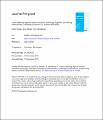| dc.contributor.author | Ifinedo, Eloho | |
| dc.contributor.author | Rikala, Jenni | |
| dc.contributor.author | Hämäläinen, Timo | |
| dc.date.accessioned | 2019-12-11T10:11:54Z | |
| dc.date.available | 2019-12-11T10:11:54Z | |
| dc.date.issued | 2020 | |
| dc.identifier.citation | Ifinedo, E., Rikala, J., & Hämäläinen, T. (2020). Factors affecting Nigerian teacher educators’ technology integration : Considering characteristics, knowledge constructs, ICT practices and beliefs. <i>Computers and Education</i>, <i>146</i>, Article 103760. <a href="https://doi.org/10.1016/j.compedu.2019.103760" target="_blank">https://doi.org/10.1016/j.compedu.2019.103760</a> | |
| dc.identifier.other | CONVID_33646565 | |
| dc.identifier.uri | https://jyx.jyu.fi/handle/123456789/66728 | |
| dc.description.abstract | To provide a diverse comprehension of teachers' TPACK (Technological, Pedagogical, and Content Knowledge) and how TPACK is reflected in practice, this study examined teacher educators' (TEs') conceptions of technology integration. Specifically, the main objective of the study was to investigate the factors influencing Nigerian teacher educators' technology integration using a self-completion survey administered to Nigerian teacher educators from three schools in the southern region of Nigeria. We utilized the partial least squares structural equation modeling (PLS-SEM) approach for the data analysis. Two frameworks—TPACK and Second Information Technology in Education Study (SITES)— guided the scale development. The results indicated that three constructs (perceived technological knowledge, teachers' knowledge [excluding technology] and perceived knowledge for integrating technology) directly influenced the TEs' technology integration, while two others (information and communication technology [ICT] pedagogical practices and perceived effect on students) did not. Among the teachers' characteristics, teaching experience, and class size were found statistically associated with their technology integration. The results of this study are beneficial for developing professional training to help teachers integrate technology specifically by developing their ICT pedagogical practices. Through such training, teachers could be enlightened on how to align their perceived effect of teaching with technology. | en |
| dc.format.mimetype | application/pdf | |
| dc.language | eng | |
| dc.language.iso | eng | |
| dc.publisher | Elsevier Ltd | |
| dc.relation.ispartofseries | Computers and Education | |
| dc.rights | CC BY-NC-ND 4.0 | |
| dc.subject.other | ICT in education | |
| dc.subject.other | technology integration | |
| dc.subject.other | teacher educators | |
| dc.subject.other | partial least square – sequential equation modeling (PLS-SEM) | |
| dc.title | Factors affecting Nigerian teacher educators’ technology integration : Considering characteristics, knowledge constructs, ICT practices and beliefs | |
| dc.type | article | |
| dc.identifier.urn | URN:NBN:fi:jyu-201912115194 | |
| dc.contributor.laitos | Koulutuksen tutkimuslaitos | fi |
| dc.contributor.laitos | Informaatioteknologian tiedekunta | fi |
| dc.contributor.laitos | Finnish Institute for Educational Research | en |
| dc.contributor.laitos | Faculty of Information Technology | en |
| dc.contributor.oppiaine | Tietotekniikka | fi |
| dc.contributor.oppiaine | Mathematical Information Technology | en |
| dc.type.uri | http://purl.org/eprint/type/JournalArticle | |
| dc.type.coar | http://purl.org/coar/resource_type/c_2df8fbb1 | |
| dc.description.reviewstatus | peerReviewed | |
| dc.relation.issn | 0360-1315 | |
| dc.relation.volume | 146 | |
| dc.type.version | acceptedVersion | |
| dc.rights.copyright | © 2019 Elsevier Ltd. | |
| dc.rights.accesslevel | openAccess | fi |
| dc.subject.yso | opettajankoulutus | |
| dc.subject.yso | opettajat | |
| dc.subject.yso | koulutusteknologia | |
| dc.subject.yso | tieto- ja viestintätekniikka | |
| dc.subject.yso | käyttöönotto | |
| dc.format.content | fulltext | |
| jyx.subject.uri | http://www.yso.fi/onto/yso/p10746 | |
| jyx.subject.uri | http://www.yso.fi/onto/yso/p1117 | |
| jyx.subject.uri | http://www.yso.fi/onto/yso/p12937 | |
| jyx.subject.uri | http://www.yso.fi/onto/yso/p20743 | |
| jyx.subject.uri | http://www.yso.fi/onto/yso/p17832 | |
| dc.rights.url | https://creativecommons.org/licenses/by-nc-nd/4.0/ | |
| dc.relation.doi | 10.1016/j.compedu.2019.103760 | |
| jyx.fundinginformation | Professor Princely Ifinedo is appreciated for his kind advice. We acknowledge the teachers who participated in the study. Finally, we thank the Faculty of Information Technology, Jyvaskyla for the travel grant that enabled the data collection. | |
| dc.type.okm | A1 | |

